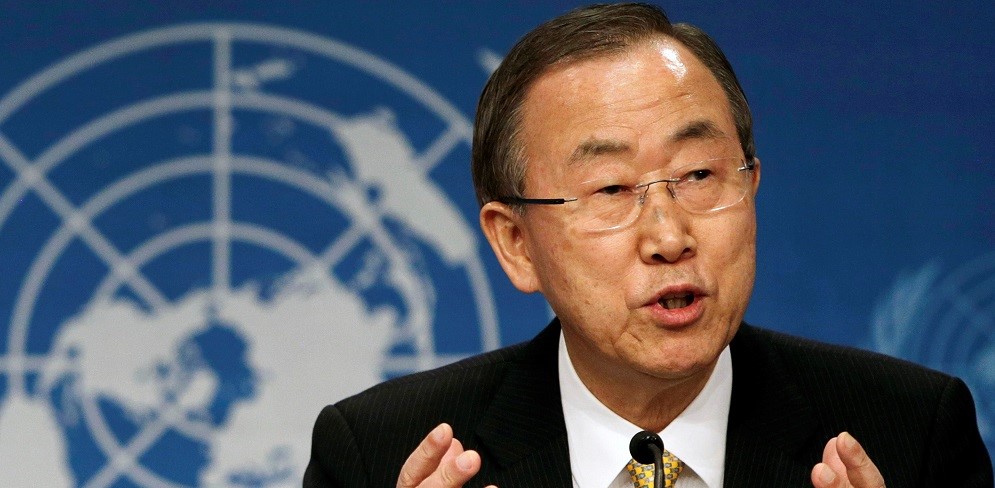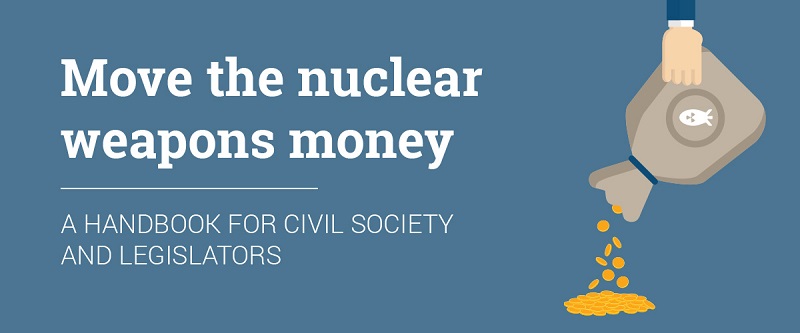UN Secretary-General Ban Ki-moon this week called on governments and civil society to better utilize the UN system in order to resolve conflicts peacefully, and to facilitate arms control and disarmament.
‘The world is over-armed and peace is underfunded,’ said Mr Ban speaking at New York University for what is likely to be his final speech on the issue before relinquishing his position.
Speaking specifically about nuclear weapons, Mr Ban noted that ‘Plans for modernizing existing nuclear arsenals decades into the future [will incur] costs that run well over $1 trillion. This is a huge amount of money. I have been arguing that just a fraction of $1 trillion would be enough for the Sustainable Development Goals to be implemented.’
This call was also made in the publication ‘Move the Nuclear Weapons Money‘ which was released last month at the Inter Parliamentary Union Assembly in Geneva. ‘Parliamentarians and civil society advocates in nuclear armed and non-nuclear countries can take measures to cut the exorbitant budgets allocated to nuclear weapons and shift these to addressing climate change and meeting SDGs,’ says Alyn Ware, principal author of the publication.
Mr Ban has been a passionate advocate for disarmament during the 8 years of his term. ‘For me, the issue is deeply personal. My own country – the Republic of Korea – experienced the ravages of war in 1950 and continues to face threats from nuclear weapons, missiles, and ballistic missiles and many other conventional arms.’
‘First, let me say, the priority must remain the elimination of nuclear weapons, which continues to pose an existential threat to humanity. States must find a clearly defined and time-bound framework to achieve this, either through a nuclear weapons convention or a set of mutually reinforcing instruments.‘
Mr Ban visited key locations during his term in office to highlight the risks and impacts of nuclear weapons. ‘I was the first UN Secretary-General to visit Hiroshima and Nagasaki… and the first world leader to visit Semipalatinsk in Kazakhstan’ (site of the Soviet nuclear tests).
5-Point Proposal for Nuclear Disarmament
During his term Mr Ban advanced a 5-point proposal for nuclear disarmament which combined the incremental measures favoured by the nuclear armed States with more comprehensive measures favoured by non-nuclear States.
Ban noted that the 5-point proposal also calls for wider supporting measures, such as universality of the conventions prohibiting chemical and biological weapons. And he noted that ‘the Security Council must fulfill its responsibility for the maintenance of international peace and security by addressing the real and present challenges posed by weapons of mass destruction.’
Nuclear-armed countries, ban treaty and nuclear disarmament
Mr Ban reflected on the new initiative of the UN General Assembly to commence negotiations on a nuclear prohibition treaty. However, with nuclear-armed States and allies likely to remain outside these negotiations, Mr Ban asks ‘How will a prohibition treaty help induce nuclear possessors to move toward elimination?’
Mr Ban recognized that current conflicts between nuclear-armed and allied States are preventing them from making significant progress on nuclear disarmament. As such, nuclear disarmament measures go hand-in hand with ‘demilitarisation of international affairs’, and ‘the peaceful resolution of disputes – as called for in the UN Charter – rather than the use of force.’ Each must reinforce and support the other.
He noted the importance of diplomacy – just one of the UN mechanisms for peaceful resolution of conflicts – and the potential for its success. ‘Diplomacy and dialogue can work to solve sensitive security problems, like the historic agreement on the nuclear programme of the Islamic Republic of Iran.’
Mr Ban concluded his presentation by welcoming his successor, Antonio Guterres. ‘I urge you to give him full support and cooperation and also to the United Nations, toward this great cause of disarmament. Together, let us continue until we reach our destination: a world free of nuclear weapons, a world free of all weapons of mass destruction or massive disruption, and a world that is safer, more secure and better for all the people.’


